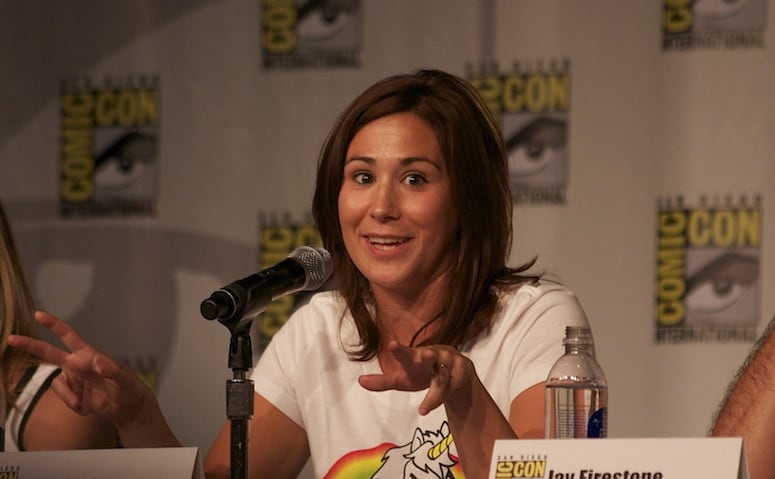Emily Andras grew up with the drama of Days of Our Lives playing out in the background. As a child, she was impressed by the constant twists and turns of the soap opera’s plot lines, but it was Twin Peaks that made her realize that television could be an art form. “I remember watching that pilot when I was a young teenager and being completely blown away,” says Emily, who will be leading a Writing Room Intensive at the Toronto Screenwriting Conference this weekend. “It was like nothing I had ever seen before. It was so atmospheric, so mysterious and so confident in its tone.”
Emily earned her chops as a writer at Toronto’s Epitome Pictures. While the production company is best known for their award-winning Degrassi series, it was Instant Star where Emily really catapulted her career. Following, she went on to be the showrunner (lead writer) and producer for the wildly popular Lost Girl, whose global cult following continues to outlive the show.
Emily’s new series, Wynonna Earp, launched on Syfy network (and CHCH) last week. Acting as both the writer and executive producer, this is another big jump in her career, but Emily doesn’t forget her humble beginnings. “I famously did craft services for a puppeteering show. I remember getting yelled at by one of the puppeteers (with a puppet on his hand) because I had cut the carrots wrong,” says Emily, who can laugh about it now. “I had two degrees. I remember thinking, ‘I’m never going to forget how this feels.’”
While humiliating, these types of experiences help to build a writer’s strength. “The truth about writing is that you constantly have to have a thick skin and experience failure over and over and over again,” says Emily. Beyond thick skin, another distinguishing factor between aspiring writers and successful ones is obvious: writing. “The scariest thing to face is the blank page. My mentor always said to me, ‘You can’t fix nothing.’ By that he meant, just write something down. Even if it’s garbage and crap, you can fix it, but you have to put your money where your mouth is.”
With the pressures of churning out new episodes at warp speed, getting words on a page is even more critical, and it’s also why television writing is a collaborative effort. “For a film, there is rarely a set deadline. Once you’re in production, it’s like a newspaper: we HAVE to shoot something. We need to have words on a page for the cast to say. We need to have something for the director to direct.”
The process is intense, which is why picking a crew of writers that work well together is crucial. “It’s like picking a baseball team: you want different types of people. Group dynamics is key, and one rotten apple can spoil the bunch. If someone is really aggressive, or if there is an issue with trust, it can disrupt the entire writing process,” advises Emily.
I imagine a boardroom with people shouting out dialogue, arguments breaking out over who should be killed off, who should fuck who?! I ask her if the drama behind closed doors is as crazy as I envision. “It’s absolutely insane! But it’s just like any workplace. Is there ever a job that doesn’t become high school? If you’re working with a bunch of people, there’s going to be someone you despise, there will always be secret romances, there’s always going to be panic.” She’s right, every office has its own drama, which is why shows like Mad Men can hold our attention for years: drama is everywhere. But the real-life drama and panic of TV is its own special breed of comedy: “The amount of panicked phone calls I’ve had, like ‘THE BLOOD BAG DOESN’T WORK!’ Something ridiculous like that doesn’t seem like real life, but it’s still big business.”
While breaking into the industry can be daunting, the good news is you don’t need to win everyone over all at once: “All you need to do is find one person who believes in you. You have to find a mentor, whether it’s another writer, professor or an agent. One good relationship, someone who is willing to go to bat for you, and you’ll be on your way.”
At the Toronto Screenwriting Conference, Emily Andras will be “demystifying” the world of television writing to attendees: What is it like to be in a writing room? How do you know when to talk? How do you know when not to talk? What happens when you decide nothing is working? What does TV writing look like, and what is the process? Informative indeed, but Emily is also out to make the day fun. Expect a lot of Buffy The Vampire Slayer. “She speaks to my wheelhouse: strong female protagonists and genre.” We’re sold.



 Follow Us On Instagram
Follow Us On Instagram
